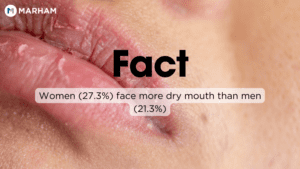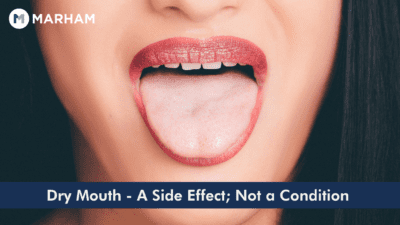Highlights
- The majority of the world population (approx. 10%) suffers from dry mouth.
- Dry mouth is not a disease; it is a side effect or symptom of any condition.
- Dryness in the mouth has several causes and has potential treatment options.
- You can also opt for home remedies for dry mouth.
Saliva plays a major role in the lubrication, moistening, and cleaning of the mouth. Moreover, it also helps in chewing and engulfing food.
When your mouth doesn’t have enough saliva, it can lead to drying and irritation in the mouth. The condition in which the salivary glands do not produce saliva is known as dry mouth or Xerostomia or Cotton Mouth Syndrome.
A dry mouth is a symptom or side effect rather than a condition itself. Approximately 10% of the world’s population suffers from Xerostomia.
In this blog post, we will understand about dry mouth, its causes, symptoms, and treatment options. We will also mention some home remedies that you can try to take away the symptoms of Xerostomia.
Dry Mouth (Xerostomia)
Dry mouth or Xerostomia is a situation in which the salivary glands do not produce enough saliva. The salivary glands are present under the tongue, in the mouth, and throat. They produce saliva which plays several roles, including:
- Prevent Tooth Decay
- Helps in Chewing and Swallowing
- Wash Away Food Particles
- Helps in Digestion
- Limit Bacterial Growth
Less production of saliva has a major impact on general health. Moreover, it also affects the health of the gums and teeth. Additionally, it also affects your appetite and food-tasting ability.
If you face severe mouth dryness, then it is advised to consult the top General Physician at your earliest convenience.
Fact: Dry mouth is more intense at night than in the daytime. This is because the mouth produces less saliva at night.
Dry Mouth Causes
Many short or long-term conditions can cause dryness in the mouth. Apart from that, it can also be a side effect of certain things happening in your life.
Some of the major reasons associated with dryness in the mouth are:
1. Medications
Hundreds of medicines including, antihistamines, decongestants, antidepressants, and some blood pressure medications can cause dry mouth as a side effect.
Many over-the-top (OTC) medications can cause dryness in the mouth. You can check the leaflet of the medicine to see whether the medicine causes dryness or not.
2. Sjogren’s Syndrome
Sjogren’s Syndrome is an autoimmune disease. It affects salivary glands, sweat glands, and eyes. In this disease, the immune system attacks the glands that produce moisture in the mouth and eyes. Dryness in the mouth or cotton mouth is also a symptom of Sjogren’s Syndrome.
3. Lifestyle Factors
The lifestyle you opt for has a major impact on your health. If you practice unhealthy activities such as smoking, alcohol usage, or too much caffeine intake, then your mouth can become dry.
Methamphetamine, a drug, can cause damage to teeth and severe dryness in mouth. This condition is called “Meth Mouth.”
Tip: If you’re a smoker, then try to lessen smoking. It not only makes your mouth dry but also causes certain other health issues.
4. Aging
Older people tend to take more medications than adults. This can cause dryness in their mouth. Moreover, the ability of their body to process medication also changes which also contributes to dryness.
Apart from that inadequate nutrition and other long-term health issues can also cause Xerostomia. It is estimated that approximately 25% of older people have Xerostomia (dryness in the mouth).
5. Cancer Therapy
Cancer treatments such as radiotherapy or chemotherapy in the upper head or neck region can also cause dryness in the mouth.
Cancer Research UK has also shown that radiation in the neck or head region can affect salivary glands. They can temporarily reduce the amount of saliva production.
6. Nerve Damage
Facial nerves control the function of salivary glands. Any illness, injury, or surgical damage to these nerves can also damage their functionality. As a result, saliva production may lessen.
7. Medical Conditions
Certain medical conditions such as Diabetes, Amyloidosis, Aids, Cerebral Palsy, Primary Biliary Cirrhosis, Parkinson’s Disease, and Lupus can cause dryness in the mouth.
Dehydration is another factor that can also cause dryness in the mouth. One should always drink plenty of water in a day to avoid health issues.


8. Infection
Any viral or bacterial infection of the salivary glands can cause restriction in the production of saliva. For example, Mumps, which is a viral disease can disrupt saliva production and cause dryness in the mouth.
Fact: Women (27.3%) face more dry mouth than men (21.3%)
Dry Mouth Symptoms
Symptoms of dry mouth (Xerostomia) include:
- Dryness in mouth and Throat
- Difficulty Swallowing and Speaking
- Bad Breath
- Tongue Sticks Against the Roof
- Dry or Cracked Lips
- Difficulty Tasting Food
- Mouth Ulcers
- Difficulty Wearing Dentures
- Burning Or Stinging Sensation in The Mouth
Dry Mouth Treatment
The treatment of Xerostomia depends on the underlying condition. Common treatment options suggested by doctors are:
- Use Over-The-Counter Saliva Substitutes
- Practice Good Oral Hygiene
- Use Dental Products (Dry Mouth Mouthwash, Dry Mouth Gum, Topical Gels)
- Antibiotics or Other Medications
- Surgery (In Case of Salivary Gland Blockage)
- Other Treatments (If there is any other underlying medical condition)
Tip: Sugar-free gums can also help in the production of saliva.
Dry Mouth Home Remedies
Everyone wants a miracle cure for dry mouth. Whether you’re facing dry mouth at night or in the morning, the following home remedies may solve the situation:
- Drink Plenty of Water
- Use Humidifier
- Spray a few drops of Aloe or Glycerin in the Mouth
- Use Alcohol-Free Mouthwashes such as Biotene Dry Mouth
- Suck On Sugar-Free Candies or Gum
- Avoid Dry, Salty, and Spicy Foods
- Take Papaya Tablets
Tip: For temporary relief, you can also take a sugar-free candy or a sip of water.
Dry Mouth Complications
The following are the potential risks and complications that can happen if you have a dry mouth:
- Tooth Decay
- Difficulty Sleeping
- Difficulty in Chewing and Swallowing
- Gum Disease
- Oral Thrush
- Difficulty Concentrating
- Depression
Final Words
Dry mouth also known as Xerostomia is a common condition that occurs in millions of people all around the world.
But if you have a persistent dry mouth, then you should not neglect it. In that case, consult the best General Physician to tackle the situation.
Frequently Asked Questions (FAQs)
1. Why Do the Mouth Feels So Dry Even After Drinking Water?
If you drink plenty of water still you feel dryness, then you might have Xerostomia. In that case, you should consult a General Physician or Dentist.
2. Is Dry Mouth Serious?
Dry mouth is rarely a symptom of anything serious. There are certain home remedies and tips mentioned in the blog above which can ease your situation.
3. What Foods are Good For Dry Mouth?
Some natural foods that are good for dry mouth include chicken, fish, soups, peanut butter, canned fruits, mashed potatoes, and others. You can also try soft-cooked vegetables, pudding, ice cream, oatmeal, etc.
4. What Vitamins Increase Saliva Production?
Vitamin A increases the saliva production. It is a fat-soluble vitamin necessary for healthy eyes, skin, and immune system. Moreover, it also keeps teeth healthy by increasing saliva production.

